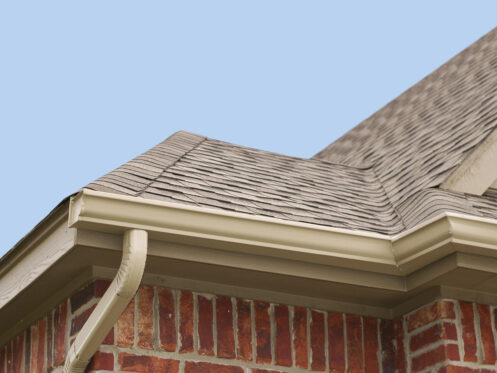Although it’s the last thing that you want to do in the spring and fall, cleaning out your gutters is an excellent way to prevent water and pest damage from harming your home. Failing to remove dried leaves or similar organic matter can also be a fire hazard. Let’s see how this is so.
A Lack of Moisture Makes Fires Easier to Start
When a leaf dies, it dries out and loses a lot of its moisture content. This reduces its ignition temperature. In other words, it doesn’t need to get as hot to burst into flames. Therefore, it may take little more than an extremely warm and sunny day to cause a fire to break out. It’s also possible that a rouge lightning strike will heat dead material enough to cause it to combust.
How Tightly Is Debris Packed?
Generally speaking, the tighter debris is packed, the less air it has to fuel a fire. Although this doesn’t preclude one from starting, it does mean that it will burn slower and cover less ground. It also means that the flames won’t be as intense, which can make it easier to put them out.
However, when debris is less tightly packed, it allows for sufficient airflow to allow a fire to grow rapidly. This means that flames can get hotter, grow taller and move quickly from the roof to other areas of your house. It may also mean that your neighbors’ homes could be in danger depending on wind patterns and other factors.
Be Especially Careful If You’re Near Power Lines
It’s common for gutters or other roof components to be located close to power lines. When working properly, they shouldn’t create enough heat to cause a fire to a clogged gutter. However, if the power line were to spark, explode or make contact with your gutter, it could create conditions necessary for a fire to begin. Therefore, it’s even more important to have a professional clean your gutters every few months when living near something that generates so much electrical output.
Watch Out for Nests or Similar Structures
You might not think much of cleaning your gutters if you don’t live near large trees. However, just because you won’t deal with leaves or twigs from nearby trees doesn’t mean that your gutters can’t be clogged with organic material. This is because a bird might make a nest that can catch on fire if struck by lightning or a downed power line. Squirrels, rodents or other animals may also take grass, acorns or other material up to the gutter to eat or build a shelter.
Pollen Is Slightly Flammable
Although it’s not nearly as dangerous as dry grass or dried leaves, pollen is somewhat flammable. This can be a problem if your home is covered with the substance as a result of nearby flowers, bushes or shrubs. While pollen is unlikely to start a fire on its own, it could get hot enough to cause the spark that results in leaves or sticks combusting.
Living Organic Material Is Less Likely to Ignite
It’s important to understand that simply seeing leaves or branches near your gutters isn’t necessarily a cause for alarm. Typically, living material is less flammable because of its higher moisture content. Therefore, even if your home is in an area experiencing a mild drought, the odds of a fire are lower. The same is typically true of dry grass that is still living but may have gone dormant because of the extremely dry weather.
The difference between living and dead organic material is also critical if something is growing out of your gutters. It’s common to see grass growing out of gutters that have standing water in them. You might also notice trees growing out of wet gutters where squirrels have dropped acorns.
If you need gutter cleaning service in Lenexa, KS, don’t hesitate to contact the team at HT Roofing & Construction today! Our team offers a variety of services such as helping with exterior painting, window replacement and siding projects to help keep your home in great shape throughout the year. Finally, we can repair and replace roofs in a timely and affordable manner.
